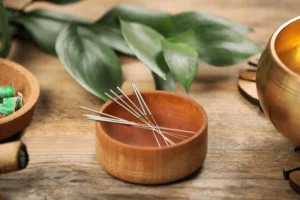What Is Qi?
Qi, pronounced “chee,” is a fundamental concept in Traditional Chinese Medicine (TCM). Qi is often translated as “vital energy” or “life force”. According to TCM it flows throughout the body, nourishing and animating all living beings. In Chinese medical theory, the balance and smooth circulation of Qi within the body are essential for maintaining good health, while imbalances or blockages can lead to various physical and emotional ailments. Understanding and harmonizing Qi is at the core of Chinese medicine’s diagnostic and treatment principles.
Why is Qi So Important?
Qi in Chinese medicine is considered to be one of the fundamental, key concepts due to its central role in maintaining overall health and well-being. Several reasons highlight the importance of Qi:
- Vital Energy. Qi is often described as the vital energy or life force that sustains all living things. It is the driving force behind various physiological processes. Qi plays a vital role in maintaining the body’s balance and functions, ensuring its functionality at all levels.
- Health Maintenance. In Chinese medicine, good health is believed to be a result of harmonious and balanced Qi flow throughout the body. When Qi is abundant, balanced, and freely circulating, the body can function optimally, and the individual experiences good health.
- Disease and Imbalance. On the other hand, illness and disease are thought to arise from disruptions in the flow or quality of Qi. Blockages, deficiencies, or excesses of Qi can lead to various health issues, ranging from physical ailments to emotional or mental imbalances.
- Holistic Approach. TCM medicine takes a holistic approach to health, focusing not only on specific symptoms but also on understanding the underlying imbalances in the body’s Qi, making a treatment not just physical, but also spiritual and emotional, ensuring well-being on all possible levels.
- Personalized Treatment. Since Qi is unique to each individual, Chinese medicine practitioners tailor their treatments based on the individual’s specific Qi pattern. This personalized approach allows for more effective and targeted therapies.
- Preventive Care. In TCM, maintaining the free flow of Qi is not only beneficial for treating existing health issues but also crucial for preventing future problems. By promoting Qi balance and harmony, Chinese medicine emphasizes proactive measures to support overall health and prevent illnesses from developing.
The concept of Qi provides a foundational framework for understanding health and disease in TCM and guides practitioners along the way of diagnosing, treating, and maintaining well-being in their patients.
Read Also: What is dry needling?
Acupuncture for Qi Balancing
Acupuncture is a well-known therapeutic modality in traditional Chinese medicine used to balance Qi energy and promote overall health. By inserting fine needles into specific acupuncture points along the body’s meridians, acupuncturists aim to regulate the flow of Qi and restore its balance.
For those seeking Qi balancing and its associated benefits, Pulse Acupuncture Center offers a specialized and highly effective approach. At the center, a skilled acupuncturist, trained in the intricacies of Chinese medicine, provides personalized treatments tailored to individual Qi patterns and health concerns. By conducting thorough assessments and understanding each patient’s unique constitution, the practitioner can develop targeted treatment plans to address specific imbalances and restore the free flow of Qi. If you would like something different, like wet cupping for Qi balancing, you can also get this kind of treatment.
Read Also: Top 10 Benefits of Acupuncture
Pulse Acupuncture Qi Balancing Benefits
The benefits of visiting Pulse Acupuncture Center for Qi balancing include:
- Experienced Practitioner. The center boasts an experienced and knowledgeable practitioner well-versed in traditional Chinese medicine principles and acupuncture techniques. Their expertise ensures that patients receive high-quality care and effective treatments.
- Holistic Approach. Holistic approach aims to restore overall balance and well-being, leading to long-lasting results.
- Personalized Treatment. Each patient’s Qi pattern and health condition are unique. At Pulse Acupuncture Center, the practitioner provides personalized treatment plans tailored to individual needs, maximizing the effectiveness of the therapy.
- Safe and Non-Invasive. Acupuncture is generally considered safe when performed by trained professionals. As a non-invasive therapy, it offers a natural and gentle approach to healing, minimizing the risk of adverse side effects.
- Stress Relief and Relaxation. Acupuncture sessions at the center provide an opportunity for relaxation and stress relief. As Qi becomes balanced and flows freely, patients often experience a sense of calm and well-being during and after their treatments.
- Support for Various Health Concerns. Qi deficiency can lead to many problems, so whether someone seeks relief from pain, management of chronic conditions, emotional well-being, or preventive care, Qi balancing through acupuncture at Pulse Acupuncture Center can be beneficial for a wide range of health concerns.
Pulse Acupuncture offers a comprehensive and personalized approach to Qi balancing through acupuncture. By leveraging the power of this ancient healing practice, individuals can experience a renewed sense of vitality, improved health, and enhanced overall well-being.
Read Also: What is Chinese Herbal Medicine?
Qi in Chinese Medicine – FAQ
What is Qi?
Qi (pronounced “chee”) is a fundamental concept in Chinese medicine and is often translated as “vital energy” or “life force.” It represents the dynamic energy that flows through the body and the universe, sustaining life and enabling bodily functions.
How Does Qi Work in the Body?
Qi flows through the body along pathways known as meridians. These meridians connect internal organs and systems, allowing Qi to circulate and support balance and health. When Qi flows smoothly, the body remains in harmony. If it becomes blocked, deficient, or excessive, illness or discomfort may occur.
How Can I Improve the Flow of Qi?
To improve Qi flow, you can:
– Practice Qi Gong or Tai Chi: These exercises enhance Qi flow and balance.
– Acupuncture and Acupressure: These therapies target specific meridian points to unblock and regulate Qi.
– Maintain a healthy diet: Eat nutritious foods and follow regular meal patterns.
– Manage stress: Techniques like meditation or breathing exercises can support Qi harmony.
– Herbal remedies: Certain traditional Chinese herbs can strengthen or regulate Qi.
How Does Qi Relate to Health and Disease?
In Chinese Medicine, good health is a result of balanced and smoothly flowing Qi. When Qi is deficient, stagnant, or out of balance, it can manifest as fatigue, pain, or illness. Restoring the proper flow and balance of Qi is a key principle in Chinese Medicine treatments.
-

Marina Doktorman, M.S., L.Ac., is an experienced acupuncturist who obtained her Masters of Acupuncture from the Tri-State College of Acupuncture in New York City in 2001. During her studies, she focused on Chinese Herbology, a branch of Traditional Chinese Medicine (TCM) that utilizes herbs to complement acupuncture treatments. Marina is licensed in both New York (NY) and New Jersey (NJ) and holds a Diplomate of Acupuncture from the National Certification Commission for Acupuncture and Oriental Medicine (NCCAOM), indicating her expertise in the field.






